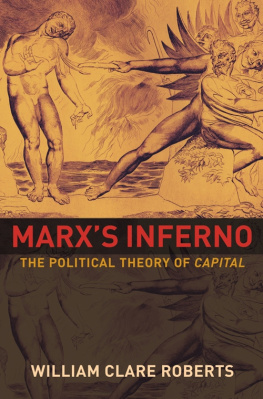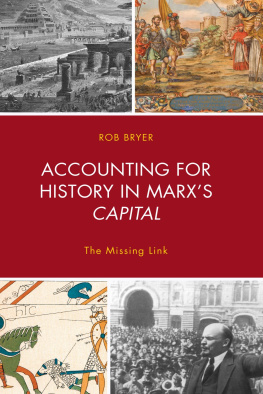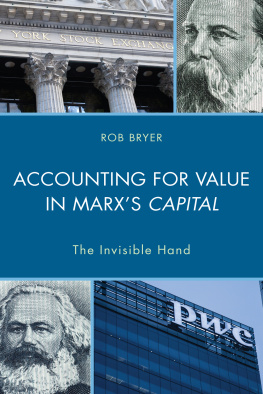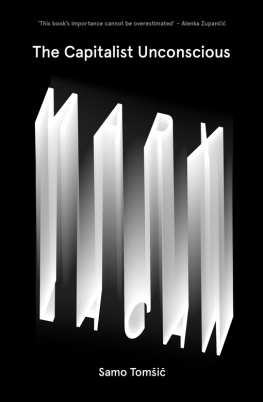
ABOUT THE AUTHOR
Jacques Bidet is a French philosopher and social theorist, currently professor emeritus in the Philosophy Department at the Universit de Paris X Nanterre. His most recent translated books are Exploring Marxs Capital: Philosophical, Economic and Political Dimensions (2007) and A Critical Companion to Contemporary Marxism (2007). He wrote the Introduction to Louis Althussers On The Reproduction of Capitalism (2014).
FOUCAULT WITH MARX
JACQUES BIDET
TRANSLATED BY STEVEN CORCORAN

Foucault with Marx was first published in 2016 by Zed Books Ltd, The Foundry, 17 Oval Way, London SE11 5RR, UK
www.zedbooks.co.uk
Copyright La fabrique ditions, 2015
English language translation Steven Corcoran, 2016
The right of Jacques Bidet to be identified as the author of this work has been asserted by him in accordance with the Copyright, Designs and Patents Act, 1988.
Typeset in Haarlemmer by seagulls.net
Index: John Barker
Cover design: Michael Oswell
All rights reserved. No part of this publication may be reproduced, stored in a retrieval system or transmitted in any form or by any means, electronic, mechanical, photocopying or otherwise, without the prior permission of Zed Books Ltd.
A catalogue record for this book is available from the British Library.
ISBN 978-1-78360-538-5 hb
ISBN 978-1-78360-537-8 pb
ISBN 978-1-78360-539-2 pdf
ISBN 978-1-78360-540-8 epub
ISBN 978-1-78360-541-5 mobi
To Annie, with whom I discussed this book page by page
Contents
NOTE ON THE TRANSLATION
The reader will note that I have translated pouvoir-savoir as knowledge-power, whereas it is customary to speak of power-knowledge in reference to Foucaults work. This way of rendering the term seems to fit better with Jacques Bidets thrust, however, since he aims to emphasise the power of the system of expertise theorised by Foucault, that is, not knowledge as such but the power that comes from having a certain position of competency. The rendering knowledge-power also indicates that it is the other term of a bipolar dimensionality of power, the other pole being the property-power theorised by Marx, from which Bidet aims at once to distinguish it while showing its varying historical relations. The agents of this knowledge-power Bidet refers to as competents-dirigeants, a compound noun that I have translated as competent-elites in order to retain the idea of the leadership function that comes with sanctioned positions of competency (although what seems thus to get lost in the English is thereby the possibility of a tension between two terms, between competency and leadership).
In his attempt to unite Foucault and Marx, to write both with and against them in bringing them together, Bidets central concept is that of metastructure. Through this concept he attempts to describe a field of possibilities and impossibilities that structures what he calls modernity, and which is irreducible to the mere relationship of exploitation characteristic of capitalism. This metastructure is a trinomial, that is, it is made up of three elements. The first is the discourse immediate, literally rendered herein as immediate discourse, which expresses a relation Bidet takes as inherent to communicational action as such (one sees the influence of John Rawls here), one between subjects who recognise each other as free and rational agents. This first element is relayed by means of two sorts of mutually presupposed contractual mediation constitutive of modernity, which form the second and third elements of the metastructure. There is inter-individual contractuality, such as that operative in transactions between market actors; and there is central contractuality, the highest form of which is the constitution of the state organisation based on a social contract. The metastructure thus contains one immediate discursive relationship and two sorts of mediated, contractual relations. These latter relays are importantly connected to what he refers to as la coordination rationnelle-raisonable, which Ive translated straightforwardly as rational-reasonable coordination, a phrase that expresses a distinction that he again adapts from Rawls. The reasonable here pertains to someones desiring for its own sake a social world in which people can cooperate as free and equal beings on the basis of terms accepted by all. The rational conveys a more instrumental aspect insofar as it concerns a single unified agent (or class) that bears powers of judgement and deliberation useful for achieving its own particular ends and interests. What Bidet aims to stress is that both market and organisation (inter-individual and central contractuality) belong to the dimension of the reasonable but also to the rational (hence the reason he speaks of a coordination between both terms), since they are modes of coordination which underlie an ideal of contractuality but also wherein systems of privilege can come to be established and develop mechanisms for their reproduction and extension. (For more on this I refer the reader to Alex Callinicoss account of Jacques Bidet in The Resources of Critique, London: Polity, 2006, pp. 3550.)
On the issue of references, the reader is referred to the standard English editions of Marx and Foucault where possible. I have modified translations, especially of Foucault, wherever the standard English translation does not convey that aspect of the French original that Bidet aims to emphasise; I have denoted each modified translation by placing tm beside the page reference. As for Bidets own works, to which, insofar as they inform the present work, he makes frequent reference, the reader will conveniently find them all listed in the references section.
Steven Corcoran
ABBREVIATIONS
Page references in the text to the following works by Foucault use abbreviated titles as follows.
The Birth of Biopolitics | BB |
Dits et crits | DE1 , etc. |
Essential Works of Foucault, 19541984 |
Vol. 1 Ethics: Subjectivity and Truth | EWF1 |
Vol. 2 Aesthetics, Method and Epistemology | EWF2 |
Vol. 3 Power | EWF3 |
Foucault Live | FL |
The History of Sexuality, Vol. 1 | HS |
Power/Knowledge | PK |
Security, Territory and Population | STP |
La Socit punitive | SPu |
Society Must Be Defended | SD |
Also
The ChomskyFoucault Debate on Human Nature , New York/London: The Free Press, 2006 | CF |
INTRODUCTION
WHY UNITE MARX AND FOUCAULT, AND HOW?
The term toward which capitalist globalisation is leading conforms to the tendency observed by Marx: a generalised commodification of goods and services, of products of knowledge, of labour power itself and of all the things of nature. That this diagnostic has borne out seems to fill some of his disciples almost with pride. But the revolutions that were to come out of the very development of capitalism veered off course. And the new man that entered the stage was not the much-awaited emancipated producer, but instead a subject normed and controlled on all sides, the subjugated subject of neoliberal power. In the vanguard of critique, it was Foucault who foresaw this outcome, coming thus to take over from Marx. But this he did in negative fashion, as a witness to defeat.
Next page












